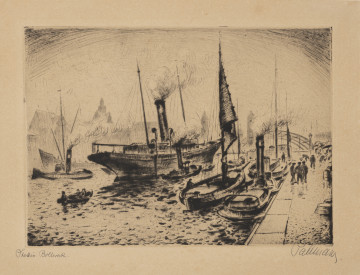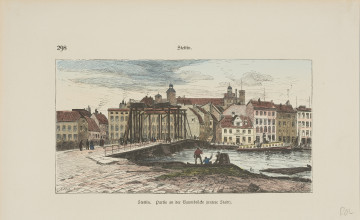
Stettin Bollwerk | The wharf in Szczecin
1920 — 1935
National Museum in Szczecin
Part of the collection: Szczecin souvenirs
Commercial development in the second half of the 19th century affected the wealth of the European bourgeoisie, with them beginning to travel extensively. As a consequence of the boom in tourism, there was a demand not only for iconography showing noteworthy parts of city views, or features specific to a particular metropolitan area, such as coats of arms or a unique building. Trinkets of all kinds, such as figurines, paperweights, music boxes, and caskets, or everyday objects such as cups, plates, and vases also made attractive souvenirs of travels. The trend was quickly extended to smaller, local tourist destinations. Some souvenirs had great artistic value, but the majority were intended for the mass market, hence their aesthetic appeal was inferior and the material they were made from was of mediocre quality. Articles made of tin, a metal with a low melting point and good mechanical properties, which contributed to the ease of casting and further processing, came into popularity. One such souvenir is a tin box from the beginning of the 20th century in the form of a very small decorative chest on four legs, the lid of which is covered with a relief depicting the wharf in Szczecin. The inscription STETTIN BOLLWERK informs us of the exact location of the depicted motif, i.e. the area of today's Bulwar Piastowski and Nabrzeże Wieleckie streets. A closer look also reveals the Kłodny Bridge, destroyed during the Second World War. Not yet to be seen against its backdrop is the monumental architectural complex of Hakenterrasse, now Wały Chrobrego, built between 1901 and 1921, which has been a signature architectural feature of Szczecin from its inception to the present day. An ornamentation composition of the box suggests that such trinkets were also available in identical form but with various other city views on the top and were produced not only for the Szczecin market.
Małgorzata Peszko
Author / creator
Object type
casket
Technique
casting
Material
tin
Origin / acquisition method
purchase
Creation time / dating
Creation / finding place
Owner
Muzeum Narodowe w Szczecinie
Identification number
Location / status

1920 — 1935
National Museum in Szczecin

1881
National Museum in Szczecin

circa 1930
National Museum in Szczecin
DISCOVER this TOPIC
Museum of King Jan III's Palace at Wilanów
DISCOVER this PATH
Educational path